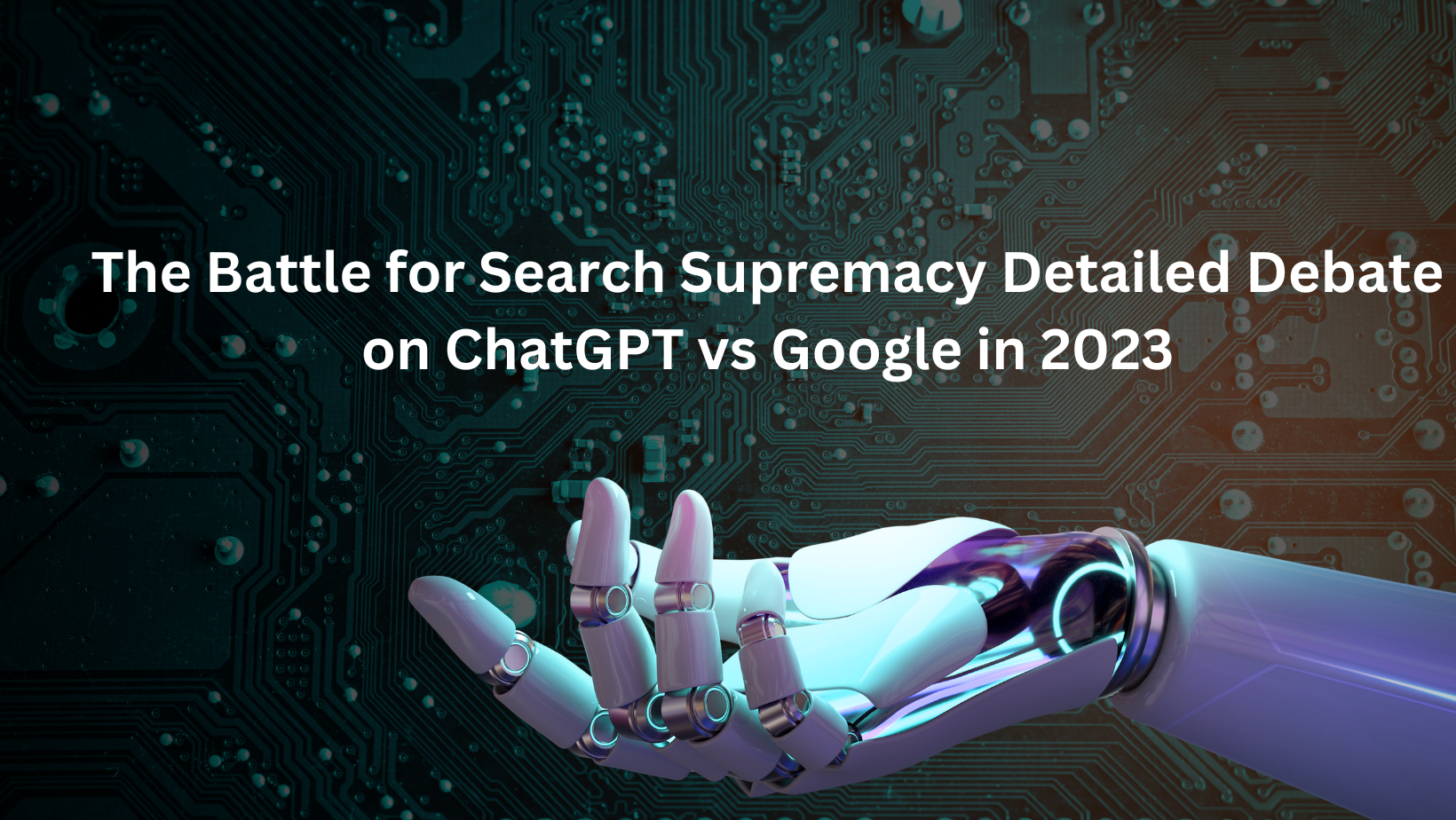Welcome, ladies and gentlemen, to a comprehensive debate on the future of search engines in 2023. In one corner, we have Google, the longstanding titan of the search industry.
And in the other corner, we have ChatGPT, the emerging challenger developed by OpenAI.
Let’s engage in a detailed analysis of these contenders as we explore their technological prowess, user experiences, market dominance, data reliability, and more in the quest for search supremacy.
Technological Superiority
Pro-Google: Google’s search algorithms have revolutionized the way we access information. Backed by vast amounts of data and advanced machine learning techniques, Google excels in indexing, crawling, and delivering highly relevant search results.
Its knowledge graph, semantic search capabilities, and integration with various services position it as a formidable force in the search landscape.
Pro-ChatGPT: ChatGPT showcases significant advancements in natural language processing. By leveraging the power of large-scale language models and deep learning techniques, ChatGPT can comprehend complex language nuances, engage in meaningful conversations, and provide contextually accurate responses.
This breakthrough allows for a more intuitive and conversational search experience, offering a promising alternative to traditional keyword-based searches.
User Experience
Pro-Google: Google’s user experience is characterized by simplicity, efficiency, and familiarity. Its minimalist interface, accompanied by a powerful search bar, delivers results quickly and effectively.
Google’s extensive features, such as image search, maps, news, and personalized recommendations, enhance the user experience, catering to a wide range of needs seamlessly.
Pro-ChatGPT: ChatGPT’s strength lies in its ability to provide personalized and conversational experiences. By engaging users in dynamic dialogue, it understands intent, refines queries, and offers precise information.
This interactive approach allows for a more tailored search experience, making it appealing to users seeking a more human-like interaction with search engines.
Market Dominance
Pro-Google: Google’s dominance in the search market is unparalleled. With a global market share of over 90%, Google has become synonymous with online search.
Its widespread adoption, brand recognition, and integration into various platforms and devices give it a significant advantage over competitors. Google’s expansive ad network further solidifies its market dominance and revenue streams.
Pro-ChatGPT: While challenging Google’s market dominance is no small feat, ChatGPT represents a potential disruptor in the search landscape.
As user expectations evolve, there is a growing demand for more conversational and personalized search experiences.
ChatGPT’s advanced language understanding, interactive nature, and potential integration into various platforms offer a compelling alternative, especially for users seeking a more tailored and interactive search interface.
Data and Reliability
Pro-Google: Google’s vast database, accumulated over two decades, provides a wealth of information for search queries. Its web crawling capabilities, coupled with machine learning algorithms, ensure comprehensive and reliable search results.
Google’s commitment to addressing biases, improving result quality, and providing transparent search guidelines contribute to its reputation as a reliable search engine.
Pro-ChatGPT: ChatGPT’s training data encompasses diverse sources, enabling it to offer unique perspectives. However, the lack of access to Google’s proprietary data may limit ChatGPT’s ability to provide comprehensive and accurate results across all domains.
OpenAI’s efforts to mitigate biases and improve the model’s reliability are commendable, but ongoing monitoring, user feedback, and fine-tuning are crucial to ensure trustworthy search results.
Privacy and Ethical Considerations
Pro-Google: Google has faced criticism and scrutiny regarding privacy practices and the handling of user data. Concerns have been raised about the collection and storage of personal information, as well as targeted advertising based on user behavior.
Google has taken steps to address these concerns by enhancing user privacy controls, implementing encryption protocols, and providing transparency in data usage policies. However, ongoing vigilance is necessary to maintain user trust.
Pro-ChatGPT: As an AI language model, ChatGPT operates differently from Google in terms of data handling. It doesn’t directly handle personal data, but it relies on data gathered from the internet for training.
OpenAI has made efforts to ensure user privacy by implementing strict data usage policies and safeguards. However, questions may arise regarding data privacy and security, as the model’s responses are generated based on patterns observed in the training data.
Conclusion:
As we conclude this detailed debate, it is evident that both Google and ChatGPT bring unique strengths and challenges to the table. Google’s technological prowess, vast resources, market dominance, and extensive data reserves position it as the reigning search giant.
On the other hand, ChatGPT’s conversational interface, advanced language understanding would be best useful tool for content Marketing, and potential for personalization offer a fresh perspective on search.
While it is unlikely that ChatGPT will completely replace Google in 2023, it has the potential to carve out its own niche as a complementary search tool, particularly for users seeking more interactive and tailored experiences.
Google’s established position, brand recognition, and integration across platforms give it a significant advantage, making it challenging for any newcomer to disrupt its dominance.
As technology continues to evolve and user expectations shift, the search landscape will undoubtedly undergo further transformations.
The future may see a coexistence of Google and ChatGPT, each catering to different user preferences and needs. Ultimately, it will be the users who determine the success and relevance of these search engines as they decide which platform aligns best with their search requirements and desires.





 Case studies
Case studies Career
Career